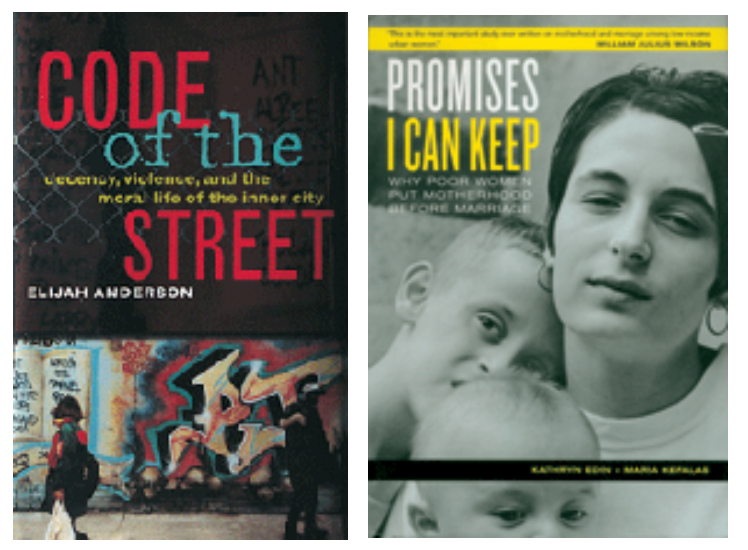
No one’s talking now, but last fall a dispute about acknowledgements and attribution in a faculty member’s new book spilled over from the sociology department to the student paper and the national news.
The controversy began last spring with the publication of Promises I Can Keep: Why Poor Women Put Motherhood Before Marriage, a book written by Dr. Kathryn Edin, associate professor of sociology at Penn, and St. Joseph’s University sociologist Maria Kefalas [“Gazetteer,” September/October 2005]. The authors interviewed 162 single mothers in Camden, New Jersey, and Philadelphia to draw a picture of what marriage and family mean to low-income urban women.
Dr. Elijah Anderson, the Charles and William L. Day Distinguished Professor of Social Science, confronted Edin about what he viewed as similarities between her work and chapters in two of his own books, Code of the Street: Decency, Violence, and the Moral Life of the Inner City (2000) [“High Noon in the ’Hood,” November/December 1999] and Streetwise: Race, Class and Change in an Urban Community (1992). Their disagreement was reportedly resolved last June with the help of an outside mediator.
On October 3, the conflict took on new life when The Daily Pennsylvanian reported on a memo written by Dr. Harold Bershady, emeritus professor of sociology, who asserted that Edin and Kefalas had “in effect committed a kind of conceptual plagiarism, taken Anderson’s ideas and concepts and represented them as being their own.”
In the wake of Bershady’s accusations, a group of 17 sociologists, led by Sara McLanahan of Princeton University, rushed to Edin’s defense, circulating a letter that ran in Almanac, Penn’s journal of record, calling the charges “absurd” and saying they suggested “a fundamental misreading of the two bodies of work.”
That letter prompted another one supporting Anderson; signed by 110 graduate students and professors from around the world, it injected the issue of race into the debate. “We do not believe that such dismissive language would have been used if the author of the original work was a white male,” the letter said. “It seems that the work of black scholars merits little or no respect for its originality, insight, or contributions.”
Though Edin has consistently declined to make any comment on the matter, Anderson—who also declined to comment to the Gazette for this article—earlier provided a written summary of his own concerns after the letter supporting Edin was published.
“Promises owes a strong and almost entirely unacknowledged debt to Code of the Street” as well as Streetwise,” he wrote in Almanac on October 11, and went on to list 22 instances of “unacknowledged overlap and repetition,” ranging from the books’ coverage of distrust in inner-city relationships to the link between a baby’s grooming and the mother’s social status, to motherhood as a response to “blocked opportunity.”
Though Edin’s and Kefalas’ book includes some citations of Anderson’s work, he argued that they give insufficient acknowledgement.
Standing by his original memo, Bershady called for “an impartial inquiry, independent of the sociology department,” and for the results to “be made known to the academic community.”
Dr. Paul Allison, chair of the sociology department, defended the process by which Anderson’s concerns were addressed and said an inquiry would happen only in response to a formal, written complaint filed with the dean of the School of Arts and Sciences. “No such complaint was ever filed,” he wrote in Almanac. “The Department stands behind the scholarship of Professor Edin and Professor Anderson, both of whom we regard as extremely valuable colleagues.”
—S.F.




